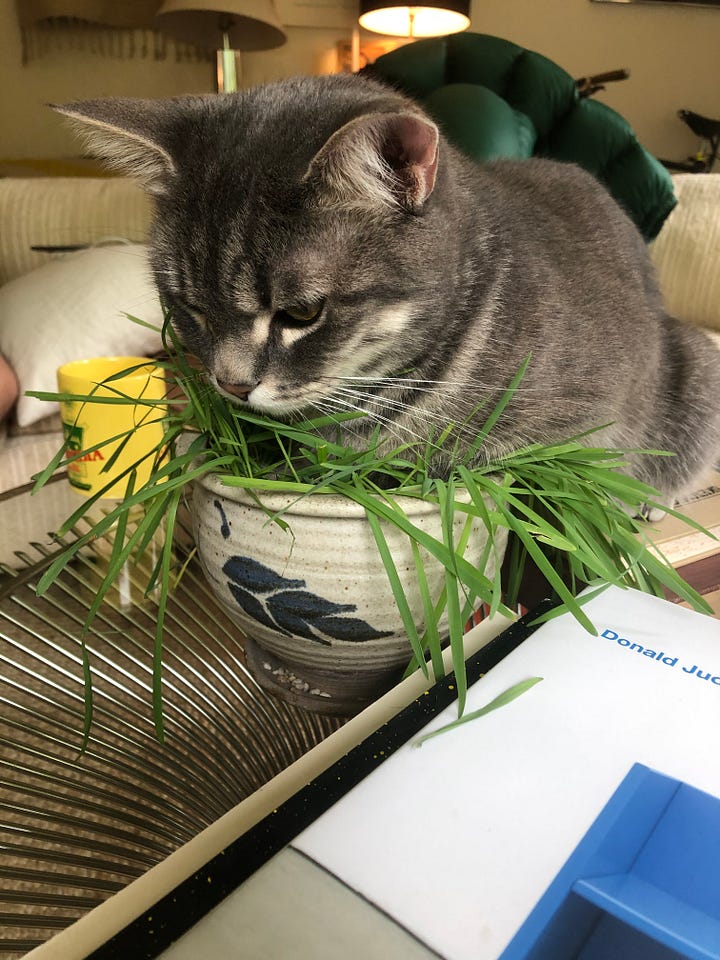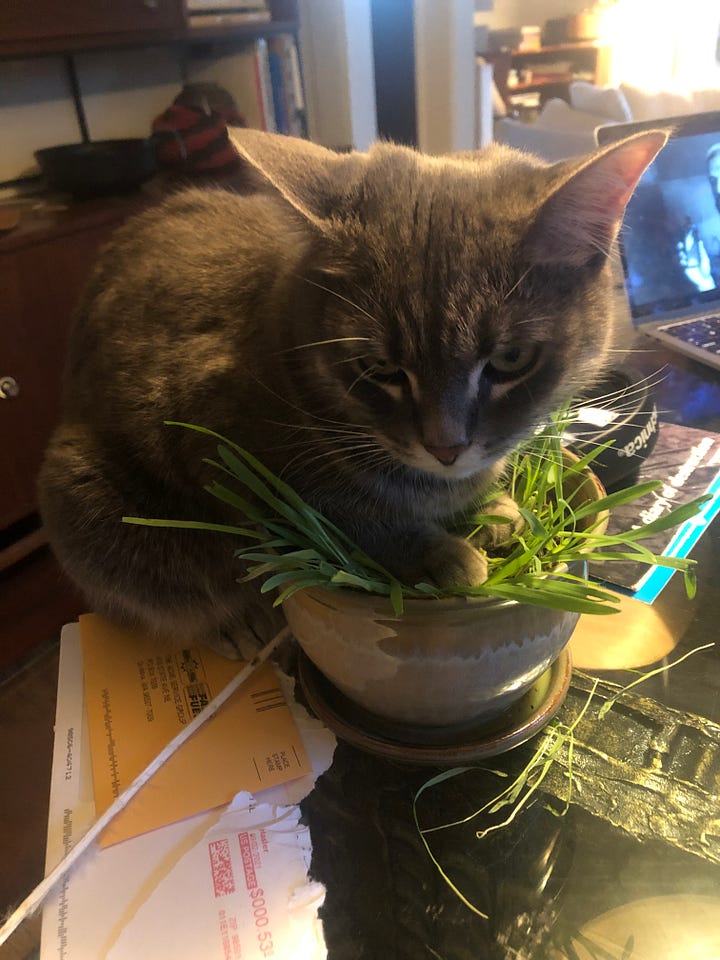ᓚᘏᗢ grass
When a cow eats grass, dozens of pounds of material are sent to an inner garbage can, where they are bathed in bacteria and fungi and subsequently “unswallowed” back into the cow’s mouth for further shredding by the molars into a delicious wad. The wad goes back to the garbage can, becomes soup as it passes through three more interesting pouches, and then, at long last, enters and is processed by the same kind of stomach all the rest of us have.
It is by comparison to this saga that the cat’s stomach, like our own, is considered to be a simple one. The grass goes in, absolutely nothing happens to it, and then the grass goes out. Neither of us have the complex stomachs or special microorganisms needed to digest the tough nut that is grass. We could not possibly subsist by it, we have no great need of it, and there are a thousand, perhaps ten thousand other objects and materials that form the greater bulk of our diets.
And yet cats, for their part, seem to love it.
We have had our own affair with grass in the fad for wheatgrass shots. This being not an honest munch of grass, but a machined grass-juice beverage to stain our teeth and cure disease. Or at least that has been the idea - something about the chlorophyll, something about the life force of a young plant, something about jewel-tones of green in a pretty glass against the brown smog of our lives.
Perhaps the benefits of wheatgrass touted by marketers are what have driven the cat, too, to eat grass; perhaps the cat’s instinct is proof of the marketers’ pitch. In fact, in a sea of grass species growing upon the earth, it is this particular family of grasses which both cats and humans so like to consume, and which are deliciously green, tender, and nutritious: the little shoots of cereals like wheat, as well as oats, barley, spelt, and rye. This is the meaning of the term “cat grass” – cat grass being not a species, but a gesture – ‘those grasses which cats like.’


And it’s true, there’s something about them. These grasses contain special vitamins, and protein; they have antibacterial properties against food poisoning and tooth decay; it has been said that they soothe an upset stomach. There are other, more dubious health claims on the internet.
But actually, we do not know the reason that cats eat grass. The above health benefits contribute a few theories. Others wonder if there is some trace nutrient that the cat occasionally needs, which might otherwise have come to the cat’s diet through the gut of mice.
Like us, cats have better poops when they’ve eaten fiber and have had enough water; as they naturally teeter on the edge of dehydration, perhaps they eat grass for this laxative effect.
Relatedly, some have thought that passing the grass helps them to pass parasites, so that cats who liked eating it would have the evolutionary advantage, so that by this point, their instinct would be to eat grass whether there are parasites or not.
And perhaps by extension, it was long assumed that cats eat grass medicinally, when they feel sick, but that has not proven true in all cases. They will also eat grass when they feel quite well.
Of course, there are times when great excitement over any food can result in barfing, as the cat’s stomach is only the size of a ping-pong ball. Eating too much or too quickly will soon result in a pile of wet leaves in some other room. But I don’t find that the grass has this effect in moderation, and in the main, I don’t think it is the cat’s desired result.
Cats are obligate carnivores, meaning that, ordinarily, every bite they eat is a living soul taken from this earth. Their molars are for crushing bone, not for chewing plants. When they eat grass, their approach hardly differs from a lawnmower; the grass is cut awkwardly from the root, then down the chute. This in stark contrast to their grace in the hunt, to their incisors so skillfully ripping flesh. The mosaic of benefits listed above notwithstanding, why should such a creature like to eat grass now and then?
How delightful that we can only guess. I love it when things are not known for sure. I love it that we can’t say why we yawn, how or why kissing began, why cats eat grass. All we know is that they love doing it.
It’s easy to grow and the seeds are cheap. You can buy the common oat here, or anywhere. Sow it in a cute pot, leave in sun or a growlight, and then present to your cat when four inches tall. You’ll find she practically sings when she sees it.
I know the feeling exactly: when I see a field of lush, green grass, my heart takes flight, though I can’t say why, and the smell of it pleases me all the more. How beautiful and simple, how mysterious life is!
≽^•⩊•^≼
hillary






